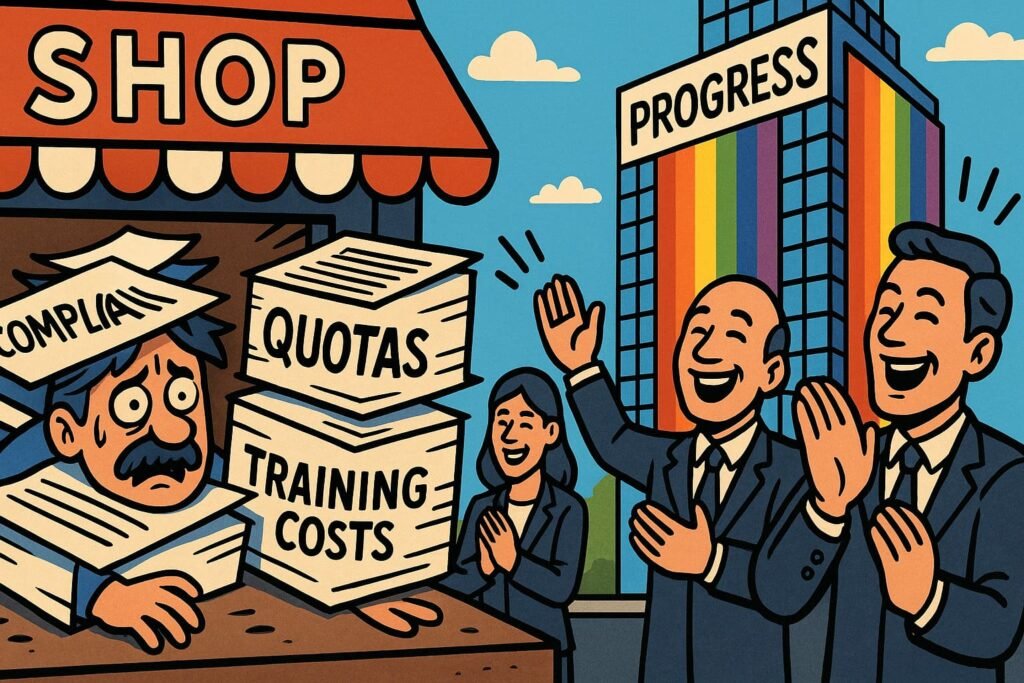Small Business vs Woke Rules Explained – The Cost of Red Tape
How Red Tape Became a Weapon
Small businesses are supposed to be the backbone of the economy. Politicians love to repeat it. Corporations love to sponsor it. Activists love to say they support it.
But when it comes to woke-inspired rules—ESG checklists, DEI audits, endless certifications—it’s the little guys who get strangled. The irony? The same regulations that supposedly “level the playing field” often tilt it even further toward the corporate giants.
Table of contents
What Are Woke Rules for Business?
In practice, these are policies and frameworks that go beyond ordinary compliance. Think:
- ESG (Environmental, Social, Governance) scoring.
- DEI (Diversity, Equity, Inclusion) mandates.
- B Corp certification as a badge of virtue.
- Language policing in HR handbooks.
For big corporations, they’re just another cost of doing business. For a 10-person bakery or a family-run shop, they can be crippling.
How It Shows Up in Practice
- Hiring: Pressure to hit demographic targets, even when skills should matter most.
- Paperwork: Hours wasted filling out ESG forms instead of serving customers.
- Costs: Paying consultants to “prove” compliance while margins shrink.
- Marketing: Being shamed for not waving the right flag or signing the latest pledge.
Meanwhile, mega-corporations hire teams of lawyers, consultants, and PR staff to breeze through. They turn compliance into branding, while small firms are left gasping for air.
Who Benefits?
- Corporations: They can afford the game—and weaponize it against smaller rivals.
- Consultants & NGOs: Whole industries are built to audit, certify, and “train” small firms.
- Politicians: They get to posture as champions of fairness without ever facing the consequences.
And who loses? The butcher, the café owner, the local repair shop—the people who don’t have a compliance department.
The Consequences
- Less competition – Small businesses fold or refuse to expand.
- Corporate monopoly – Giants fill the gap and raise prices.
- Cultural conformity – Everyone parrots the same slogans to avoid trouble.
- Community loss – Independent shops, family businesses, and local character disappear.
What’s sold as progress often ends as consolidation.
Conclusion
The woke rules aren’t neutral. They’re not harmless. They’re a filter system: if you’re big enough to play, you survive. If you’re not, you’re crushed.
And that’s the biggest irony—rules promoted in the name of fairness end up entrenching inequality.
FAQ
Why are small businesses more affected than big ones?
Because small firms don’t have compliance teams, legal departments, or the cash to waste on endless box-ticking.
Isn’t this just normal regulation?
No. Standard safety or tax rules apply to everyone. Woke rules add ideological tests—values statements, diversity quotas, ESG rankings—that go far beyond basic law.
Do consumers care?
Most don’t. They care about price, quality, and service. The “virtue” badges are more about pleasing investors, activists, and regulators than real customers.
What’s the endgame?
A marketplace dominated by giants, where independent business is treated as non-compliant by default.



